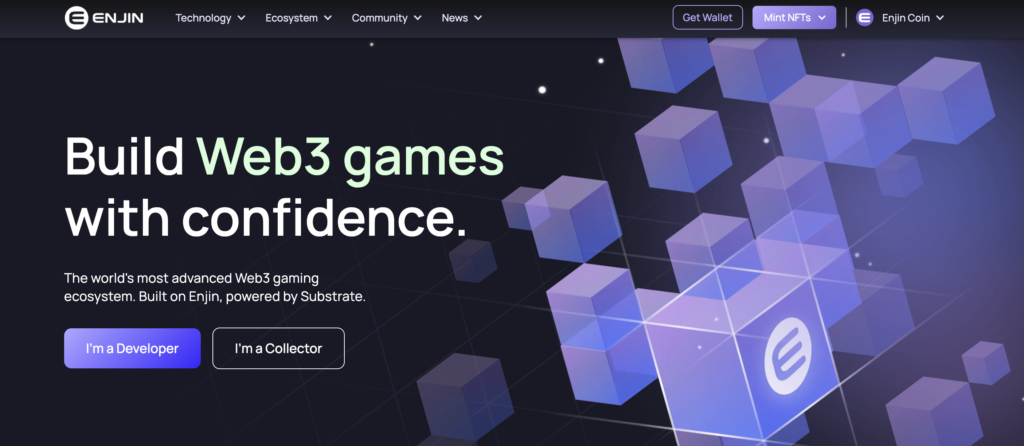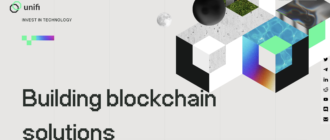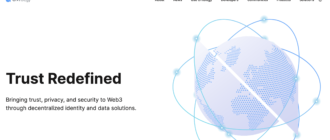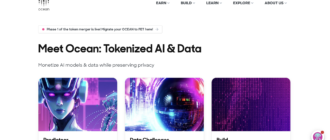In this article, we will delve into the Enjin Coin project and its associated cryptocurrency, ENJ. This comprehensive overview will cover various aspects of the project, including its historical background, technological framework, tokenomics, ecosystem, growth prospects, and future outlook. Enjin Coin is a pioneering project in the blockchain gaming sector, offering a suite of tools and platforms that integrate blockchain technology with gaming applications. Our exploration will provide a detailed understanding of how Enjin Coin aims to revolutionize the gaming industry through its innovative use of blockchain technology.

What is Enjin Coin?
Enjin Coin (ENJ) is a blockchain-based cryptocurrency specifically designed for the gaming industry. It serves as the native token for the Enjin ecosystem, a comprehensive suite of tools and platforms aimed at integrating blockchain technology into gaming and digital assets. Enjin enables developers to create, manage, and trade virtual goods seamlessly across various platforms, ensuring secure ownership and easy transferability. By using smart contracts, Enjin allows for the minting of unique fungible and non-fungible tokens (NFTs) which can be traded or integrated within different games. The core objective of Enjin Coin is to enhance the gaming experience by providing a decentralized, scalable, and efficient infrastructure for managing digital assets.
History of Enjin Coin
Enjin Coin was founded in 2009, initially as a gaming community platform. The transition into blockchain technology began in 2017 with the launch of its Initial Coin Offering (ICO) in October, raising approximately $18.9 million. The early years focused on developing the core components of the ecosystem, including the Enjin Platform, the Enjin Wallet, and the Enjin Marketplace.
In 2018, Enjin announced plans for Efinity, a channel network solution designed to scale the Enjin ecosystem efficiently. By 2019, the Enjin Marketplace was launched, providing a dedicated platform for trading digital assets. The project gained further momentum with the introduction of the Enjin Blockchain, which was tailored for NFTs and digital assets, offering features like “Fuel Tanks” to absorb transaction fees and “Discrete Accounts” for easier user interaction.
In recent years, Enjin has expanded its interoperability capabilities through Efinity, now functioning as a matrixchain on the Enjin Blockchain and initially developed as a Polkadot parachain. Efinity aims to facilitate cross-chain interoperability and scalability, enhancing the overall utility and reach of Enjin’s digital assets within the broader blockchain ecosystem. The continuous development and strategic partnerships have positioned Enjin Coin as a significant player in the blockchain gaming sector.
How Enjin Coin Works
Enjin Coin operates on the Ethereum blockchain and leverages a combination of on-chain and off-chain processes to manage digital assets efficiently. At its core, Enjin uses smart contracts to mint unique fungible and non-fungible tokens (ERC-1155) which can be integrated into games and traded on the Enjin Marketplace. The project’s primary aim is to provide a decentralized platform where game developers and users can create, manage, and trade virtual goods securely and seamlessly.
Underlying Technologies
1. Smart Contracts:
Enjin utilizes Ethereum-based smart contracts to mint and manage digital assets. These smart contracts ensure that the assets are secure, transparent, and tamper-proof. When developers want to create a new in-game item, they send ENJ to a smart contract, which then mints the new token. This token can be traded or used within games, and can be exchanged back to ENJ, ensuring the backing value is always maintained.
2. Enjin Platform:
The Enjin Platform is a comprehensive suite of tools that includes APIs, SDKs, and a robust development platform designed to facilitate the integration of blockchain technology into games. This platform supports the creation, management, and trading of blockchain assets without requiring deep blockchain expertise from developers.
3. Enjin Wallet:
The Enjin Wallet is a feature-rich mobile wallet that supports a wide range of cryptocurrencies and blockchain assets. It allows users to manage their digital assets, including ENJ and ERC-1155 tokens, securely. The wallet also features a smart wallet capability that connects with Trusted Platforms, enabling seamless transactions within the Enjin ecosystem.
4. Efinity:
Efinity is Enjin’s interoperability solution initially developed as a Polkadot parachain and now integrated as a matrixchain on the Enjin Blockchain. Efinity allows for cross-chain interoperability, enabling assets to be transferred across different blockchain networks. It supports high transaction speeds and low costs, making it an efficient solution for managing large-scale digital assets.
Blockchain and Consensus Mechanism
Enjin Blockchain:
The Enjin Blockchain is specifically designed for gaming and digital assets. It integrates core functionalities like NFT creation and transfer directly into the blockchain, reducing reliance on external smart contracts. This integration provides scalability and cost efficiency, essential for handling high volumes of transactions in gaming applications.
Consensus Mechanism:
Enjin Coin is built on the Ethereum blockchain, which currently uses a Proof-of-Stake (PoS) consensus mechanism. In PoS, validators are chosen based on the number of tokens they hold and are willing to “stake” as collateral. This mechanism is energy-efficient compared to the Proof-of-Work (PoW) system, as it does not require intensive computational power to validate transactions. Validators earn rewards for securing the network and validating transactions, contributing to the overall security and decentralization of the blockchain.
Technical Differentiators
Fuel Tanks:
Enjin’s unique feature, “Fuel Tanks,” allows developers to absorb transaction fees on behalf of their users, enhancing user experience by eliminating the need for users to pay gas fees for transactions within games.
Discrete Accounts:
Discrete Accounts are a novel approach to user interaction within the Enjin ecosystem. These accounts do not require traditional wallet software, simplifying the process for users to engage with blockchain assets without needing extensive blockchain knowledge.
Paratokens:
Efinity introduces “paratokens,” a new token standard that facilitates seamless asset transfers across different parachains within the Polkadot ecosystem. This cross-chain functionality is crucial for enabling interoperability and broadening the utility of digital assets beyond a single blockchain.
Tokenomics of Enjin Coin
Enjin Coin (ENJ) is a token rather than a coin, as it exists on the Ethereum blockchain and adheres to the ERC-20 standard. This distinction is crucial as it defines the operational and economic model of ENJ within the broader Ethereum ecosystem. Below, we delve into the specifics of ENJ’s tokenomics, covering its issuance model, supply dynamics, and value propositions.
Issuance Model
Enjin Coin has a fixed maximum supply of 1 billion ENJ tokens. The distribution of these tokens was structured to support the project’s long-term sustainability and growth:
- Presale: In September 2017, 400 million ENJ were sold during the presale event, raising 38,800 ETH.
- Initial Coin Offering (ICO): The ICO in October 2017 made 300 million ENJ available for sale, raising approximately 75,041 ETH.
- Team and Advisors: 10% of the total supply was allocated to the Enjin team and advisors, with a vesting schedule to ensure long-term commitment.
- Community and Partnerships: Another 10% was reserved for community initiatives, beta testing, marketing, and strategic partnerships.
Supply Dynamics
The supply of Enjin Coin is designed to decrease over time as ENJ is locked into the creation of in-game assets. When developers mint new tokens, they send ENJ to a smart contract where it gets locked. This process reduces the circulating supply of ENJ, potentially increasing the token’s scarcity and value. As more games and applications are built on the Enjin Platform, more ENJ is expected to be locked up, reinforcing this deflationary mechanism.
Value and Market Performance
The value of Enjin Coin is influenced by its utility within the Enjin ecosystem and its broader adoption in the gaming industry. ENJ provides a reliable store of value for digital assets, allowing users to trade, buy, and sell in-game items with intrinsic value backed by ENJ.
- Market Performance: ENJ has experienced significant volatility, typical of cryptocurrencies. It reached its all-time high of $4.85 during the 2021 bull run. The token’s price is influenced by market trends, adoption rates, and developments within the Enjin ecosystem.
- Utility: ENJ’s primary use is to back the value of digital assets on the Enjin Platform. This utility provides inherent value to ENJ, differentiating it from other gaming tokens that may lack such a robust backing mechanism.
Technological and Economic Impact
The Enjin Coin’s tokenomics are tightly interwoven with its technological framework:
- Scarcity Mechanism: The minting process directly impacts ENJ’s supply, creating a deflationary pressure as more tokens are locked up in digital assets.
- Staking and Governance: ENJ holders can participate in staking and governance within the Enjin ecosystem, particularly through platforms like Efinity, which further integrates ENJ into the operational framework.
Enjin Coin’s tokenomics are designed to foster a sustainable and growing ecosystem by aligning the interests of developers, users, and investors. The strategic locking of ENJ into digital assets and its role within the Enjin and Efinity platforms ensure a robust economic model that supports long-term value appreciation and utility within the blockchain gaming space.
Where to Buy Enjin Coin (ENJ)
Enjin Coin (ENJ) is widely available for purchase on several major cryptocurrency exchanges. Below is a list of prominent exchanges where you can buy ENJ:
- Binance: One of the largest and most reputable cryptocurrency exchanges, Binance offers a wide range of trading pairs including ENJ/USDT and ENJ/BTC.
- HTX (formerly Huobi): HTX provides robust trading options for ENJ, allowing users to trade ENJ against various fiat and crypto pairs.
- MEXC: Known for its extensive list of cryptocurrencies, MEXC offers trading pairs like ENJ/USDT, providing a reliable platform for buying ENJ.
- Bybit: A popular exchange for both spot and derivatives trading, Bybit lists ENJ, allowing users to trade it with high liquidity.
- KuCoin: Another well-regarded exchange, KuCoin supports multiple trading pairs for ENJ, including ENJ/USDT and ENJ/BTC, ensuring users have various options for trading.
Where to Store Enjin Coin (ENJ)
When it comes to storing Enjin Coin (ENJ), users have several secure and user-friendly wallet options. Here are some recommended wallets:
- Enjin Wallet: The official wallet from Enjin, it is highly secure and supports all ERC-20 tokens, including ENJ. It offers features like biometrics for security, an integrated exchange for swapping tokens, and the ability to manage NFTs.
- Trust Wallet: A versatile and widely used wallet that supports ENJ among numerous other cryptocurrencies. Trust Wallet is known for its user-friendly interface and strong security features, including backup and recovery options.
- MetaMask: A popular browser extension and mobile wallet that allows users to interact with the Ethereum blockchain. MetaMask supports ENJ and provides easy access to decentralized applications (dApps).
- Ledger Nano S/X: These are hardware wallets that provide the highest level of security for storing ENJ. Hardware wallets store the private keys offline, which makes them immune to online hacking attempts.
- MyEtherWallet (MEW): A web-based wallet that allows users to store and manage ENJ securely. MEW provides an easy interface for interacting with the Ethereum blockchain and supports all ERC-20 tokens.
Each of these wallets offers unique features and levels of security, allowing users to choose one that best fits their needs. For the highest security, especially for long-term storage, hardware wallets like Ledger Nano S/X are recommended. For ease of use and accessibility, Enjin Wallet and Trust Wallet are excellent choices.
Project Prospects
Growth Basis
The growth of Enjin Coin (ENJ) is primarily driven by the increasing integration of blockchain technology in the gaming industry and the rising demand for digital assets. Enjin provides a unique solution by enabling the creation, management, and trading of non-fungible tokens (NFTs) within games, thus enhancing the gaming experience and offering new revenue streams for developers. The deflationary mechanism of ENJ, where tokens are locked in NFTs, reduces supply and potentially increases value over time, further driving interest and adoption.
Clients and Partners
Enjin’s clientele and partners span a broad spectrum of the gaming and blockchain industries. The project has formed strategic partnerships with several high-profile companies and organizations, which significantly bolster its credibility and reach. Some notable partners include:
- Microsoft: Partnered with Enjin to create Azure Heroes, a blockchain-based rewards program.
- Unity: Enjin has integrated with the Unity game engine, allowing developers to easily incorporate blockchain assets into their games.
- PC Gamer: Collaboration to enhance the gaming experience with blockchain technology.
- Samsung: Enjin Wallet is pre-installed on Samsung Galaxy smartphones, broadening user access to ENJ and blockchain assets.
Development Forecast
The development forecast for Enjin Coin is positive, given the continuous advancements in blockchain technology and the growing adoption of NFTs in gaming. As more developers and users engage with the Enjin ecosystem, the demand for ENJ is expected to rise. The ongoing development of Efinity, a cross-chain NFT solution, also promises to expand Enjin’s interoperability and scalability, making it more attractive to a broader range of applications beyond gaming.
Ecosystem
Enjin boasts a robust ecosystem designed to support a wide array of blockchain applications, particularly in the gaming sector. This ecosystem includes various platforms and tools that facilitate the creation, management, and trading of blockchain assets. Key components of the Enjin ecosystem are:
- Enjin Platform: A comprehensive suite of tools and APIs that enable developers to create and integrate blockchain assets.
- Enjin Wallet: A secure, multi-functional wallet for managing ENJ and other cryptocurrencies, as well as NFTs.
- Enjin Marketplace: A dedicated marketplace for trading NFTs and other blockchain assets, providing liquidity and accessibility for users.
- Efinity: A cross-chain NFT platform designed to enable seamless interoperability between different blockchain networks, enhancing scalability and user engagement.
By continuously expanding and enhancing its ecosystem, Enjin is well-positioned to maintain its leadership in the blockchain gaming industry and explore new opportunities in other sectors.
Conclusion
Enjin Coin stands out in the rapidly evolving landscape of blockchain-based gaming, presenting a robust ecosystem designed to support the creation, management, and trading of digital assets. With its strong technological foundation, strategic partnerships, and innovative solutions like the Enjin Blockchain and Efinity, Enjin is well-positioned to drive significant advancements in the gaming industry. As the project continues to grow and evolve, it will be crucial to monitor its development and adoption to gauge its long-term impact and success.






